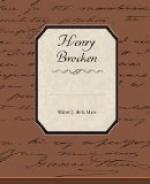“And—did you walk? Pah! there’s the mystery! God knows how else you could have come, unless you are a modern Ganymede. Where then’s your aquiline steed, sir? We have no neighbours here—none to stare, and pry, and prate, and slander.”
I informed him that I was as ignorant as he what power had spirited me to his house, but that so far as obvious means went, my old horse was probably by this time fast asleep beside the green gate at which I had entered. Jane stood on tip-toe and whispered in his ear, and, nodding imperiously at him, withdrew into the house.
Complete silence fell between us after her departure. The woods stood dark and motionless in the yellow evening light. There was no sound of wind or water, no sound of voices or footsteps; only far away the clear, scarce-audible warbling of a sleepy bird.
“Well, sir,” Mr. Rochester said suddenly, “I am bidden invite you to pass the night here. There are stranger inhabitants than Mr. and Mrs. Rochester in these regions you have by some means strayed into—wilder denizens, by much; for youth’s seraphic finding. Not for mine, sir, I vow. Depart again in the morning, if you will: we shall neither of us be displeased by then to say farewell, I dare say. I do not seek company. My obscure shell is enough.” I rose. “Sit down—sit down again, my dear sir; there’s no mischief in the truth between two men of any world, I suppose, assuredly not of this. My wife will see to your comfort. There! hushie now, here he floats; sit still, sit still—I hear his wings. It is my ‘Four Evangels,’ sir!”
It was a sleek blackbird that had alighted and now set to singing on the topmost twig of a lofty pear-tree near by; and with his first note Jane reappeared. And while we listened, unstirring, to that rich, undaunted voice, I had good opportunity to observe her, and not, I think, without her knowledge, not even without her approval.
This, then, was the face that had returned wrath for wrath, remorse for remorse, passion for passion to that dark egotist Jane in the looking-glass. Yet who, thought I, could be else than beautiful with eyes that seemed to hide in fleeting cloud a flame as pure as amber? The arch simplicity of her gown, her small, narrow hands, the exquisite cleverness of mouth and chin, the lovely courage and sincerity of that yet-childish brow—it seemed even Mr. Rochester’s “Four Evangels” out of his urgent rhetoric was summoning with reiterated persuasions, “Jane Eyre, Jane Eyre, Jane Eyre, Ja ... ne!”
Light faded from the woods; a faint wind blew cold upon our faces. Jane took Mr. Rochester’s hand and looked into his face.
She turned to me. “Will you come in, Mr. Brocken? I have seen that your horse is made quite easy. He was fast asleep, poor fellow, as you surmised; and, I think, dreaming; for when I proffered him a lump of sugar, he thrust his nose into my face and breathed as if I were a peck of corn. The candles are lit, sir; supper is ready.”




